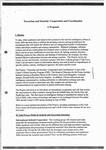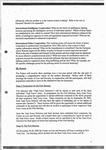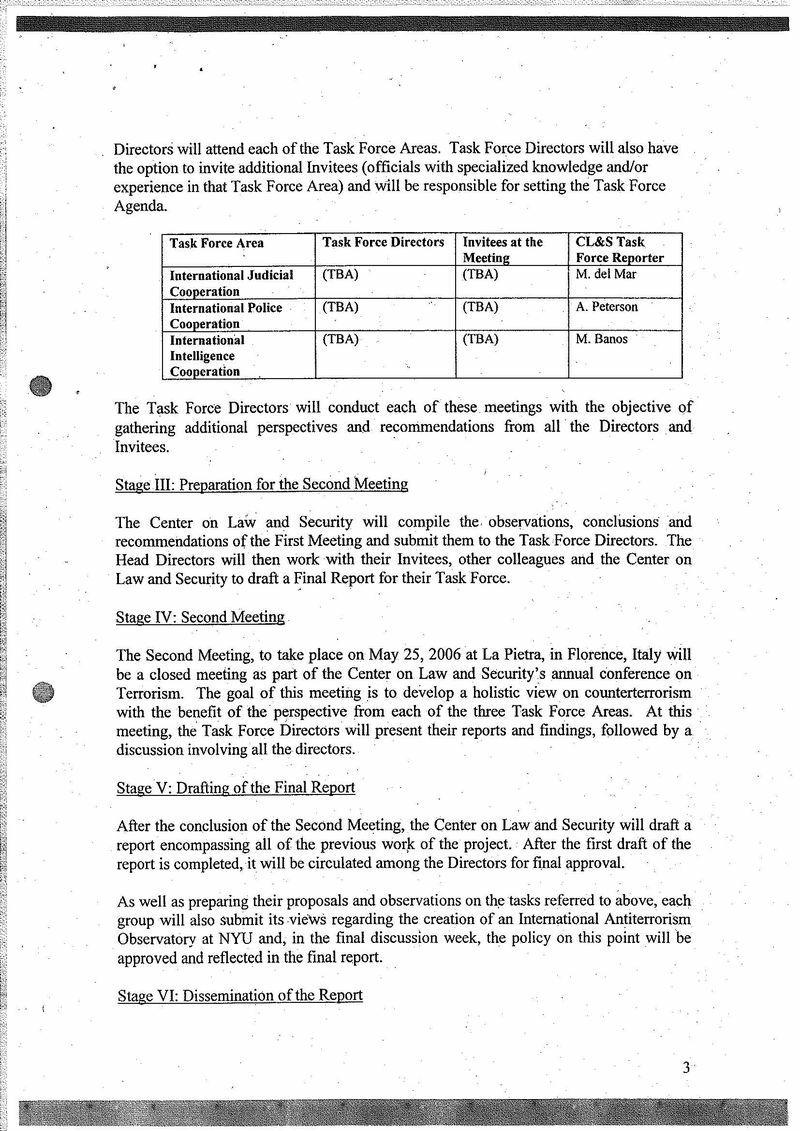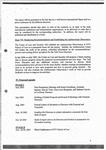| Information |  | |
Derechos | Equipo Nizkor
| ||
| Information |  | |
Derechos | Equipo Nizkor
| ||
Dec05
Terrorism and Security: Cooperation and Coordination
A Proposal
I. Mission
To date, while academics and analysts have pointed to the need for intelligence reform at home, little has been done to address the pressing concerns among practitioners for mechanisms that will enable the effective and yet safeguarded transfer of information within individual countries and among communities. Bilateral exchanges, informal contacts and ad hoc relationships have helped create a culture of information exchange that is uneven at best, inefficient at worst and, above all, lacking systemic direction. Differing criteria for the collection and sharing of information, for example, has often harmed effective information between and among countries. This Project, led by the Center on Law and Security, envisions a project with three working groups ("Task Force Areas") all devoted to issues of information sharing, but each focused on impediments of specific entities; namely, intelligence agencies, the police and the courts.
The Project, "Terrorism and Security: Cooperation and Coordination" is part of the Center's Global Security Program (GSP). The Board of Directors for the Project include Baltasar Garzon (a Resident Fellow at the Center), Jean-Louis Bruguière, Armando Spataro, Ronald Noble and Javier Rupérez. In addition, US law enforcement and intelligence representatives, leading authorities on information exchange and other experts will be invited to participate and offer insights into problems and recommendations for improvements in global information sharing.
The Project will focus in its first phase on transatlantic cooperation and will then extend the conversation to other countries, among them the Middle East, the Pacific Rim and South East Asia. The first report on intelligence sharing is scheduled for release in the Fall of 2006, with a series of meetings and papers to be exchanged between November 2005 and the Center's GSP annual meeting in June of 2006.
Below is a more detailed description of the Project, including explanations of the Task Force Areas, the Projects proposed process and a draft of the events calendar for the next two years.
II. Task Forces: Fields of Analysis and Governing Questions
International Judicial Cooperation: This working group will examine and make proposals for streamlining counterterrorism policies for the prosecution of terrorists. Major questions will include: what are the different laws and legal procedures regarding the apprehension and prosecution of suspected terrorists? How does the common law system of the US and the UK differ from the European court system and to what particular effect in these prosecutions? How do evidentiary procedures and regulations differ between the countries and systems? How can the differing systems work more effectively with one another or is the current system working? What is the role of Eurojust? Should it be expanded?
International Intelligence Cooperation: What are the limits on intelligence sharing between and among the intelligence services of individual nations? Which of these limits are established by law, which by custom? How have international databases enhanced the ability of intelligence agencies to track and apprehend suspected terrorists? What are the structural impediments to enhanced cooperation?
International Police Cooperation: This working group will assess the limits of police cooperation in antiterrorism investigations. How often and in what context is there regular information sharing? What are the impediments to extradition? Has the European Arrest Warrant improved the ability of police in Europe to arrest suspected terrorists? What is the role of Interpol and Europol in this process and how might each be enhanced for more effective counterterrorism policy? What new areas of coordination need to be explored, beyond the structures, formal and informal, that have developed in crime-fighting related to organized crime, drug trafficking and the like? What, for example, are the specific challenges posed for the policing sector by terrorist financing?
III. Process
The Project will involve three meetings over a two-year period with the end goal of producing a comprehensive report on the matters discussed. Before each of these meetings the Center of Law and Security, in conjunction with the participants, will draft preparatory materials to serve as the substantive base for discussion.
Stage I: Preparation for the First Meeting
Two directors (the "Task Force Directors") will be chosen to lead each of the three individual "Task Force" areas. In preparation for the First Meeting, these Task Force Directors are given the opportunity to submit additional comments to the above proposal for their respective Task Force Area. These comments are due by September 30, 2005. Each Task Force Director will also have the option of submitting one or two names of experts (the "Invitees"). These Invitees will be given the opportunity to submit additional comments to the proposal and will also be invited to participate in their respective Task Force Areas at the First Meeting.
Once the Task Force Directors and their Invitees have submitted their comments, the Center on Law and Security will compile them into a comprehensive report for each of the Task Force Areas. Drafts of these reports will be submitted to the all the Task Force Directors for final approval before the beginning of the First Meeting.
Stage II: The First Meeting
On November 18-20, 2005 the Center on Law and Security will host a meeting in New York City. The Meeting will be divided into the three Task Force Areas, and all Directors will attend each of the Task Force Areas. Task Force Directors will also have the option to invite additional Invitees (officials with specialized knowledge and/or experience in that Task Force Area) and will be responsible for setting the Task Force Agenda.
Task Force Area Task Force Directors Invitees at the Meeting CL&S Task Force Reporter International Judicial Cooperation (TBA) (TBA) M. del Mar International Police Cooperation (TBA) (TBA) A. Pelerson International Intelligence Cooperation (TBA) (TBA) M. Bancs The Task Force Directors will conduct each of these meetings with the objective of gathering additional perspectives and recommendations from all the Directors and Invitees.
Stage III: Preparation for the Second Meeting
The Center on Law and Security will compile the observations, conclusions and recommendations of the First Meeting and submit them to the Task Force Directors. The Head Directors will then work with their Invitees, other colleagues and the Center on Law and Security to draft a Final Report tor their Task Force.
Stage IV: Second Meeting
The Second Meeting, to take place on May 25, 2006 at La Pietra, in Florence, Italy will be a closed meeting as part of the Center on Law and Security's annual conference on Terrorism. The goal of this meeting is to develop a holistic view on counterterrorism with the benefit of the perspective from each of the three Task Force Areas. At this meeting, the Task Force Directors will present their reports and findings, followed by a discussion involving all the directors.
Staae V: Drafting of the Final Report
After the conclusion of the Second Meeting, the Center on Law and Security will draft a report encompassing all of the previous work of the project. After the first draft of the report is completed, it will be circulated among the Directors for final approval.
As well as preparing their proposals and observations on the tasks referred to above, each group will also submit its views regarding the creation of an International Antiterrorism Observatory at NYU and, in the final discussion week, the policy on this point will be approved and reflected in the final report.
Stage VI: Dissemination of the Report
The report will be presented on the last day by a well-known international figure and in a press conference by the different directors.
This presentation should take place in each of the countries or, at least, in the main international institutions and humanitarian organizations, or be delivered in order that it may be considered by the corresponding authorities. In addition, the report will be published and distributed as a book.
Stage VII: Monitoring Recommendations and Establishing the Antiterrorism Observatory
The Center of Law and Security will establish the Antiterrorism Observatory at NYU School of Law as a permanent home for the project. Initially, the Antiterrorism Center will further the work of the project, collecting information on the recommendations' process and creating follow up reports for the Task force Directors.
In late 2006 or early 2007, the Center on Law and Security will propose a future meeting date to discuss progress along the proposed recommendations and next steps. The Task Force Directors and any additional invitees will convene to discuss which recommendations have proven to be the most fruitful, whether existing recommendations need to be revised or new ones proposed and how to proceed going forward. The Directors will also evaluate the Antiterrorism Observatory's work as well as provide feedback on how to improve its activities.
IV. Proposed Agenda
STAGE I
June 2005 First Preparatory Meeting with Karen Greenberg, Armando Spataro, Gijs de Vries, Jean-Louis Bruguipere, and Baltasar Garzón at La Pietra, Florence July 2005 Drafting of Initial Proposal and Round of Meetings with Potential Directors Aug. 2005 Formal Letters of Invitation to Directors with Proposal and Timetable Sept. 30 2005 Deadline for Directors to submit substantive comments for first draft of report Oct. 20 2005 Draft of report sent to all Directors and Invitees in preparation fur November meeting. STAGE II
Nov. 18-20, 2005 First Conference at NYU School of Law STAGE III
Feb. 2006 CL&S drafts report compiling progress at the Conference and submits report to Lead Directors for comment and review May 2006 Head Directors draft final report for their Task Force Area, incorporating the work of the Second Conference and their "Invitees." STAGE IV
May 25-27, 2006 Second Meeting at La Pietra with final presentation of report STAGE V
Aug. 2006 CL&S drafts final report and submits it to Directors for approval STAGE VI
Sept. 2006 Report disseminated to officials, organizations and institutions STAGE VII
TBD Third Meeting to discuss progress of recommendations and next steps.





Click on images to enlarge
[Editorial Note: Project Proposal made by Judge Baltasar Garzón and meant to count with the participation, among others, of John Negroponte, Director of US Intelligence. The estimated budget for this "Terrorism and Security: Cooperation and Coordination" proposal amounted to 1,234,200 dollars.
This document was provided by the Spanish Corporation CEPSA at the request of the Spanish Supreme Court in the corruption proceedings against Judge Baltasar Garzón; said proceedings originated in the fact that Judge Garzón had shelved (on November 27th, 2006) a complaint against the President of the Santander Banking Group, Emilio Botín, right after he came back from a long stay in New York where he was officially supposed to be learning English and after having received several hundreds of thousands of dollars in funds from Santander Bank to organize a series of conferences in New York.]
 | This document has been published on 03Jun13 by the Equipo Nizkor and Derechos Human Rights. In accordance with Title 17 U.S.C. Section 107, this material is distributed without profit to those who have expressed a prior interest in receiving the included information for research and educational purposes. |